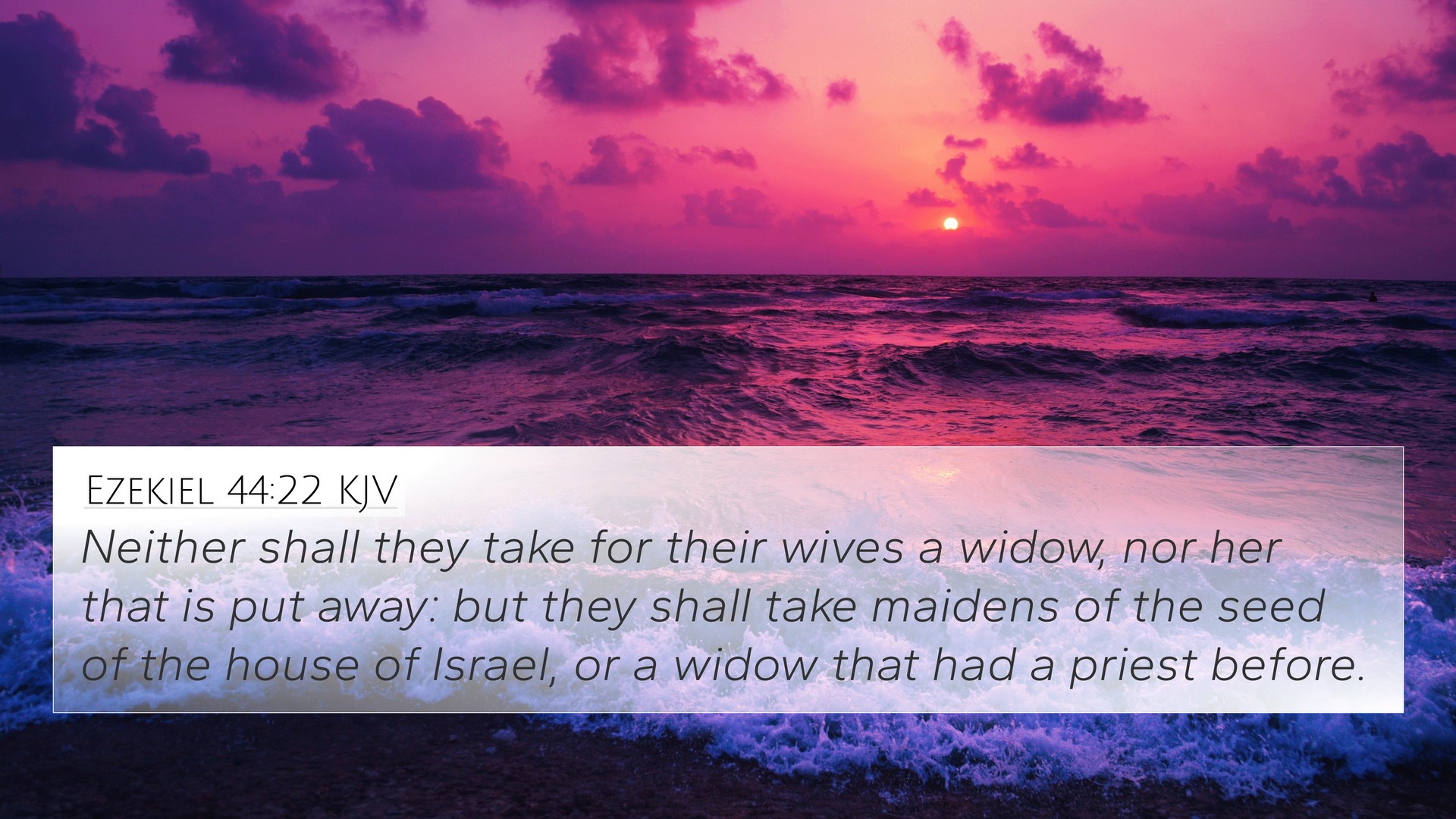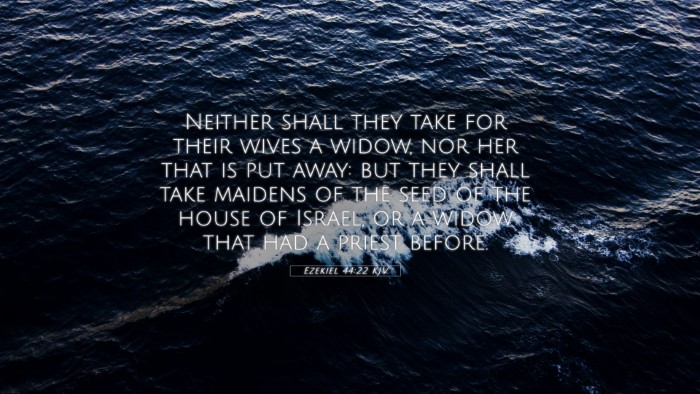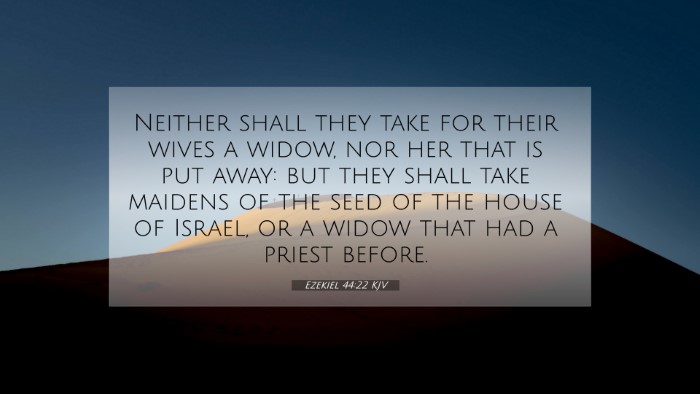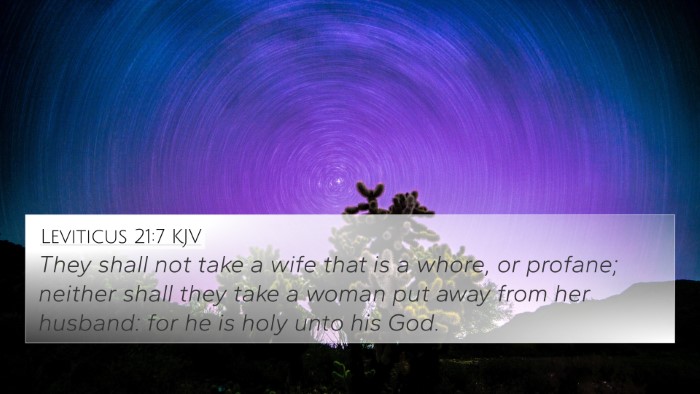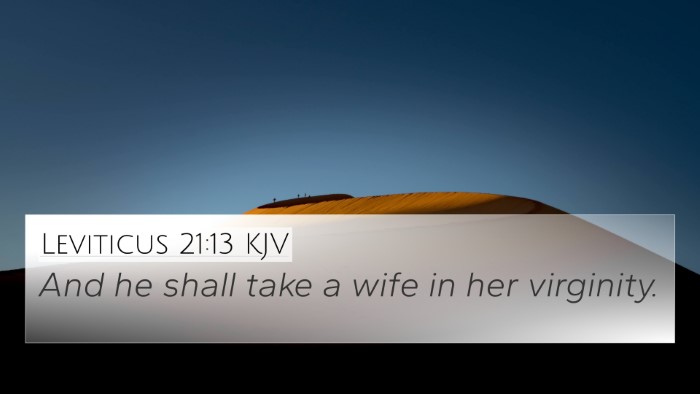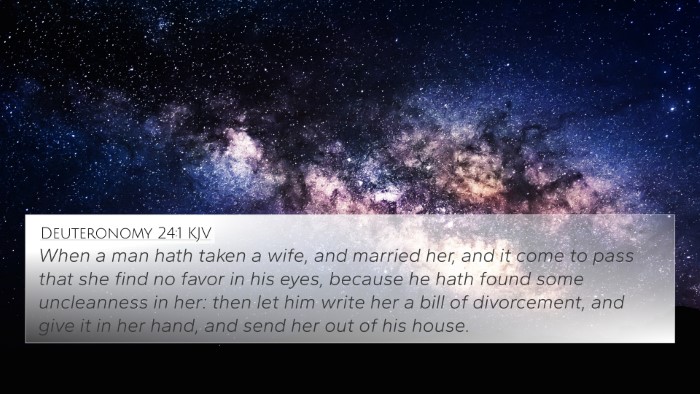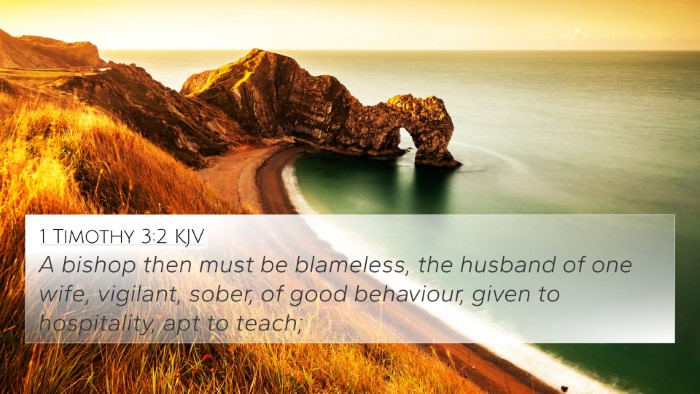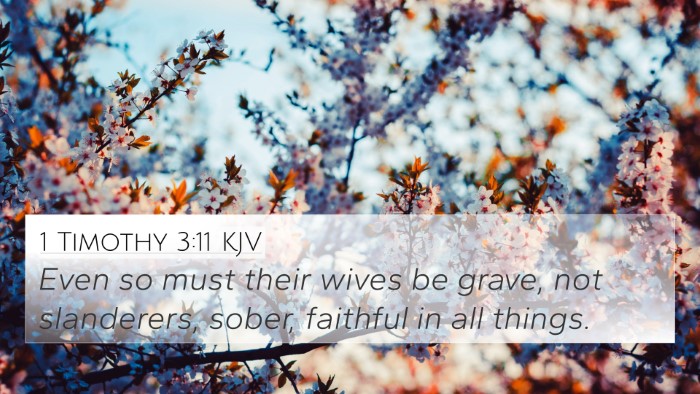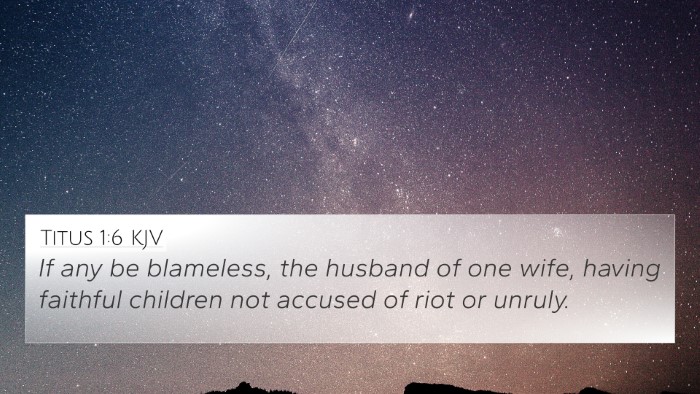Ezekiel 44:22 - Verse Meaning and Interpretation
Ezekiel 44:22 states, "Neither shall they take for their wives a widow, nor her that is put away: but they shall take maidens of the seed of the house of Israel, or a widow that had a priest before." This verse is part of Ezekiel's vision concerning the future temple and the duties of the priests. Here, significant emphasis is placed on the holiness and purity expected of those who serve in sacred roles.
Summary of Insights
The following points encapsulate the meaning of Ezekiel 44:22 based on various public domain commentaries:
- Matthew Henry: Henry emphasizes the importance of maintaining purity in the priesthood. He suggests that the priests, representing God among the people, should not engage in relationships that might compromise their holy responsibilities. By restricting their choice of wives to maidens or widows of priests, the text underscores the standards that should govern their conduct.
- Albert Barnes: Barnes highlights that these restrictions serve to distinguish the priestly line and uphold the integrity of worship. He notes that the rules surrounding marriage in this context are meant to preserve the sanctity of the priesthood and reflects the fidelity required of those serving in such roles.
- Adam Clarke: Clarke points out that the stipulation regarding marriages indicates a divine concern for holiness and the generational implications of priestly lineages. His commentary suggests that these regulations were not merely about personal purity but also about the collective integrity of the priestly community.
Bible Verse Cross-References
Ezekiel 44:22 relates to several other scriptures that provide deeper understanding and context:
- Leviticus 21:7: "They shall not take a wife that is a whore, or profane; neither shall they take a woman put away from her husband: for he is holy unto his God." This verse highlights the same themes of purity and the restrictions on priestly marriages.
- Deuteronomy 7:3: "Neither shalt thou make marriages with them; thy daughter thou shalt not give unto his son, nor his daughter shalt thou take unto thy son." This regulation reinforces the idea of maintaining a holy lineage and guarding against cultural influences.
- 1 Peter 2:9: "But ye are a chosen generation, a royal priesthood, an holy nation, a peculiar people..." The New Testament connects believers as a spiritual priesthood, reflecting the holiness expected in Ezekiel's day.
- Malachi 2:11: "Judah hath dealt treacherously, and an abomination is committed in Israel and in Jerusalem; for Judah hath profaned the holiness of the Lord which he loved, and hath married the daughter of a strange god." This verse indicates the consequences of failing to uphold God’s standards in relationships.
- John 3:3: "Jesus answered and said unto him, Except a man be born again, he cannot see the kingdom of God." This mirrors the theme of spiritual rebirth and purity as necessary for those serving God, akin to the requirements of the priests.
- Romans 12:1: "I beseech you therefore, brethren, by the mercies of God, that ye present your bodies a living sacrifice, holy, acceptable unto God, which is your reasonable service." Just as priests are called to holiness, believers are exhorted to live in a manner pleasing to God.
- Hebrews 7:26: "For such an high priest became us, who is holy, harmless, undefiled, separate from sinners, and made higher than the heavens." This passage underscores the standard of holiness that the high priest Jesus Christ embodies, parallel to the expectations set for earthly priests.
- Exodus 19:6: "And ye shall be unto me a kingdom of priests, and an holy nation..." Reinforces the idea of being set apart for God’s purposes, similar to the priests described in Ezekiel.
- Matthew 5:8: "Blessed are the pure in heart: for they shall see God." Highlights the blessing associated with purity, a theme central to the lives of priests.
Understanding the Importance of Holiness
The significance of holiness in the priestly roles as described in Ezekiel highlights a broader theme of purity throughout Scripture. This commitment to holiness serves not just as a requirement for leadership but also as a model for all believers today.
Connections Between Bible Verses
The links among various scriptures illuminate the consistency of God's message regarding holiness. The following themes can be drawn from the connections made in these verses:
- Holiness as Essential for Service: The consistent call for purity among priests highlights that their service before God requires them to be set apart (Leviticus 21:7, 1 Peter 2:9).
- Consequences of Unfaithfulness: Malachi 2:11 serves as a warning against marrying outside of God’s directive, reflecting the seriousness of maintaining the integrity of God’s people.
- The Role of Jesus as the Perfect High Priest: In Hebrews, the comparison of Christ's holiness draws attention back to the standards upheld in the Old Testament, affirming God’s unchanging nature.
Cross-Referencing Biblical Texts
Utilizing a Bible cross-reference guide can be essential for understanding complex themes like those presented in Ezekiel 44:22. These guides help in finding links between scriptures and exploring how a verse may relate to broader theological concepts.
Tools for Bible Cross-Referencing
To deepen your understanding of connections between verses, consider using the following resources:
- Bible concordance
- Cross-reference Bible study materials
- Online Bible study tools for thematic analysis
Conclusion
The insights derived from Ezekiel 44:22 manifest a profound respect for the purity required within the priesthood, reflecting a much broader expectation of holiness that resonates through both the Old and New Testaments. As believers engage in cross-referencing Bible verses, they not only enrich their understanding but also strengthen their faith, recognizing the persistent call to live according to God's standards throughout scriptural history.
